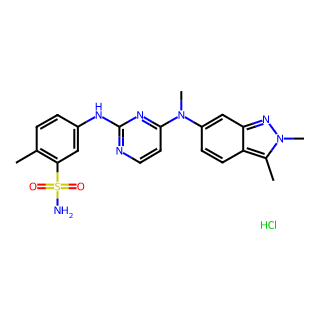- Synthetic anti-infective drugs
- Medications for the digestive system
- Antipyretic and analgesic drugs
- Medications for the blood system
- Medications for the respiratory system
- Anti-allergic drugs
- Medications for the urinary system
- Diagnostic medications
- Immunosuppressive and immunomodulatory drugs
- Vitamins and mineral supplements
- Antioxidants and medications for osteoporosis
- Antiparasitic drugs
- Ophthalmic medications
- Amino acids and their derivatives
- Dermatological medications
- Medications for the circulatory system
- Antitumor drugs
- Medications for the nervous system
- Hormonal and endocrine function-regulating drugs
- Antibiotics
- Others
CAS Number: 635702-64-6




Basic Information
Product Name: Pazopanib Hydrochloride
CAS Number: 635702-64-6
Molecular Formula: C21H23N7O2S·HCl (or C21H24ClN7O2S when considering the hydrochloride ion)
Molecular Weight: 473.98
Physical Properties
Appearance: White to off-white solid or powder
Solubility: Highly soluble in organic solvents such as dimethyl sulfoxide (DMSO), practically insoluble in ethanol and water (solubility is approximately 10~20 μM)
Purity: Typically above 98%, with high-purity products even reaching above 99%
Chemical Properties
Stability: Should be stored under specific conditions (e.g., -20°C, protected from light, sealed, and dry) to ensure its stability
Reactivity: As a multi-target tyrosine kinase inhibitor, Pazopanib Hydrochloride may react with other chemicals, so it should be avoided from contacting incompatible substances during use and storage
Pharmacological Effects
Multi-target Tyrosine Kinase Inhibitor: Pazopanib Hydrochloride primarily inhibits the activity of vascular endothelial growth factor receptors (VEGFR) and related tyrosine kinases (such as PDGFR, FGFR, c-Kit, etc.), blocking the formation of new blood vessels in tumors and thereby inhibiting tumor growth and spread
Antitumor Effects: It has broad applications in tumor biology research. Researchers use its ability to inhibit angiogenesis to study the growth, invasion, and metastasis mechanisms of tumor cells. Through in vitro cell experiments and in vivo animal models, the efficacy and safety of Pazopanib Hydrochloride for various tumor types (such as renal cell carcinoma, soft tissue sarcomas, ovarian cancer, and non-small cell lung cancer) can be assessed

Tai Yau Street, San Po Kong, Kowloon, Hong Kong, China.



